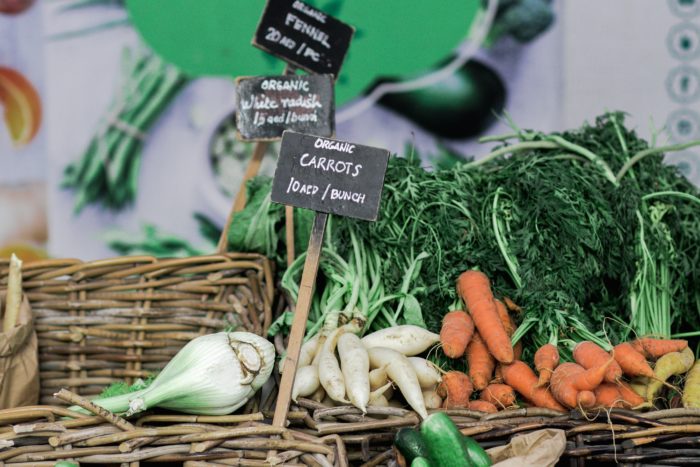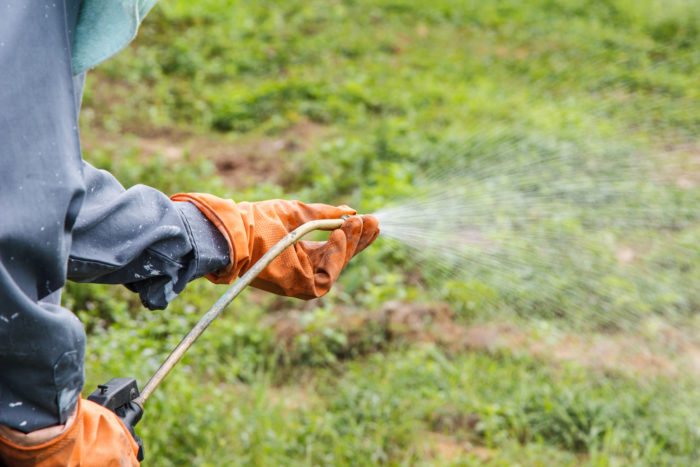What’s the deal with glyphosate? Does it really affect our gut health as much as everyone’s making it seem, or is it truly a harmless weed killer?
You may have heard of glyphosate, also known as Roundup, in the news recently. Recent claims of high levels found in foods ranging from kids cereals to ice cream have put the spotlight on this commonly used agricultural product.
For almost 50 years, conventional farmers have used glyphosate on their crops to kill weeds and pests. They spray it on their fields between plantings in order to reduce weed populations and use it as a desiccant on grain and bean crops.
Farmers in the United States alone have sprayed enough of this chemical on their crops to cover every acre of farmland in the world with nearly half a pound of this chemical.
So, it comes as no surprise that we’re now finding traces of glyphosate in our food.
Monsanto – the original creators of the glyphosate-containing Roundup – have claimed for years that this product is safe and non-toxic for humans. But, as with most things previously deemed “safe,” we’re now learning that we didn’t understand the entire story.
There have been claims recently challenging this belief that glyphosate is indeed non-toxic for humans. Human epidemiological studies (ones that look at health trends over time) have found correlations between glyphosate exposure and a variety of health concerns.
And while these studies alone cannot determine causation, results like these definitely warrant further research and investigation by the scientific community. This information may motivate consumers (like you and me) to make lifestyle changes to avoid these potentially harmful toxins.
In this article, I’m going to dive into the potentially harmful effects that glyphosate exposure can have on our gut health.
Keep reading to learn more about the connection between gut health and glyphosate!
What is Glyphosate?
Glyphosate is the active ingredient in Monsanto’s weed killer, Roundup. And is used to kill weeds that interfere with agricultural crops like soy, canola, corn, and wheat.
Glyphosate is a non-selective herbicide. It works by disrupting certain enzyme activity that plants need for growth.
As you can imagine, this non-selective nature of glyphosate makes it difficult to kill weeds selectively and protect crops for harvest.
To combat this, Monsanto developed the first “Roundup Ready” soy crop in 1996. This crop was genetically engineered to be resistant to the effects of glyphosate. This means that the chemical wouldn’t have an effect on the actual crop, just the weeds that grow around it.
This should have been a red flag that glyphosate usage was taking our farming in an unnatural direction. But, unfortunately, glyphosate usage has only been increasing.
By 2014, glyphosate application reached 240 million pounds worldwide. And with an increase in genetically modified crops, glyphosate usage is only going to keep rising.
How Glyphosate Works
Glyphosate works by disrupting what’s called the shikimate pathway in plants, fungi, and bacteria.
Application of this herbicide will inhibit the plant enzyme EPSP synthase. And without that enzyme, the plants cannot produce other proteins essential to their growth.
Glyphosate was originally deemed non-toxic for humans is because humans bodies don’t contain this enzymatic pathway.
However, the human body doesn’t just consist of human cells. Our gut is home to hundreds of thousands of bacteria that help to keep us healthy and thriving.
And, unfortunately, these friendly gut bugs that inhabit our intestines ARE susceptible to glyphosate exposure, resulting in possible negative effects on our gut health.

Gut Health and Glyphosate
Anything we put in our mouths is going to impact the health of our gut. Typically, eating a diet high in fruits, vegetables, healthy fats, and high-quality protein sources will only benefit your gut and overall health.
Once contaminated with glyphosate, produce is no longer strictly a source of nutrients and fiber. It’s now a vehicle for a potentially harmful environmental toxin.
In general, the causative effects of glyphosate on human health (most studies have been done on animals, for obvious ethical reasons) is still up for debate. But, research does show that glyphosate isn’t as harmless as we once thought it to be.
Especially when it comes to the health of our gut.

Glyphosate: A Disruptor of Our Microbiome
Glyphosate may not be able to negatively affect our human cells, but it certainly has an impact on our gut bacteria.
Like I discussed earlier, glyphosate works to prevent plant growth by disrupting enzymes in the shikimate pathway. This pathway isn’t present in human cells but is present in plants. And more importantly also in our gut bacteria.
So, even though glyphosate may be “non-toxic” to humans (which is still up for debate), it definitely isn’t non-toxic to our gut bacteria.
A study completed in May 2018 exposed rats of varying ages to “safe” human-equivalent doses of glyphosate over the course of 13 weeks.
Baby rats who were exposed to these “safe” levels of glyphosate had significant disruptions in the health of their microbiome.
And while this study only looked at rats, these findings should make us think twice about the safety of glyphosate exposure in humans especially when it comes to children and their developing gut bacteria.
Another study showed that potentially pathogenic bacteria like Salmonella and Clostridium are highly resistant to the effects of glyphosate.
Conversely, beneficial gut bugs like Enterococcus, Bifidobacterium, and Lactobacillus were moderate to highly susceptible to damage from glyphosate exposure.
This potential decrease in beneficial gut bugs compared to pathogenic ones, called dysbiosis, is a significant driver of a host of gut-related health issues.
Ensuring you’re getting high-quality sources of probiotics in your diet is one way to combat this bacteria shift in your gut. But avoiding unnecessary exposure to glyphosate will help eliminate one potential root cause of this issue.

Glyphosate: A Factor Behind Leaky Gut
Disrupting our delicate microbiome balance isn’t the only way that glyphosate can potentially impact the health of our gut.
Glyphosate exposure can result in an increase in intestinal permeability, also known as leaky gut.
Leaky gut develops when the integrity of our intestinal lining is compromised. This allows contents of the gut to actually “leak” into our bloodstream.
Proteins called tight junctions are what mediates our gut lining integrity.
When these tight junctions are working properly, they’re acting as a barrier between our gut and our bloodstream. They keep food particles and bacteria in the digestive tract, and out of the rest of our body.
However, when these tight junctions aren’t working well, as is the case with leaky gut, the contents of the intestines can make their way into our bloodstream. This can cause a host of health issues like food allergies, inflammation, and IBS.
The main driver behind glyphosate induced leaky gut seems to be the impact this chemical can have on the release of a protein called zonulin.
Zonulin is a protein that modulates tight junction integrity in the gut. And our tight junctions start to get “leaky” when too much zonulin is released into our gut.
The interaction between zonulin and glyphosate is simple. The higher the glyphosate levels in your gut, the more zonulin is going to be released. The more zonulin present, the more permeable your intestines will be.
Taking care to eat a diet low in industrial seed oils and processed foods can help to reduce inflammation and quell the effects of leaky gut.
Avoiding extra exposure to glyphosate is another big factor in improving this area of gut health.

Glyphosate: A Cause of Slowed Motility
Even when we’re not eating, our gut is still working.
Between meals, the Migrating Motor Complex (MMC) is busy at work, acting as a cleansing mechanism for your digestive tract. The MMC uses peristaltic movements which send waves through your gut. These waves move undigested food, other particles, and bacteria through your GI tract.
Without this cleansing of our gut between meals, food would sit stagnant in our intestines. This can result in fermentation causing unpleasant symptoms like gas and bloating.
Unfortunately, glyphosate exposure can affect the proteins in the smooth muscles of your gut. This impairs the ability of the Migrating Motor Complex to work properly.
Rats exposed to non-toxic doses of glyphosate exhibited motility disturbances in their gut. These motility disturbances persisted even after the glyphosate was removed.
This means that glyphosate was a factor behind the slowing of the rat’s gut motility. The glyphosate prevented those vital cleansing waves from occurring.
Remember, this study was performed on rats, not humans. But research like this certainly lays the groundwork for connecting glyphosate exposure to impaired gut health. And it’s unlikely research like this would be ethical to conduct in humans, so I wouldn’t hold your breath for the human studies!
Without proper gut motility, you can become more susceptible to conditions like Small Intestinal Bacterial Overgrowth (SIBO), constipation, and acid reflux.
If you’re experiencing any gut motility issues, avoiding products contaminated with glyphosate is an important step to take in preserving your gut health.
Would you like to save this post?
Your email address is 100% safe and will never be sent spam.
Is it Gluten or Glyphosate that’s Affecting Your Gut Health?
The prevalence of gluten-free food in restaurants and grocery stores has skyrocketed over the last few years.
This may partially be because eating gluten-free has become a trendy health fad. But it’s also because Celiac Disease and Non-Celiac Gluten Sensitivity (NCGS) diagnoses have increased four-fold over the last 50 years.
This rise in prevalence cannot be attributed to diagnostic improvements alone. There seems to be an environmental factor at play when it comes to this increase in sensitivity to gluten.
The ability of glyphosate to trigger a zonulin release is strikingly similar to the reaction to gluten in genetically-susceptible individuals.
If you have the genes for it, gluten consumption can trigger an increase in zonulin in your gut. This results in increased intestinal permeability, just like with glyphosate exposure.
So if you experience symptoms after eating wheat, is it the gluten or the glyphosate that’s actually making you sick?
More glyphosate, More Gut Problems
The use of glyphosate on wheat has also risen sharply in the last decade. This increase exhibits a strikingly similar trend to the increase in diagnoses of Celiac Disease in the United States.
It also doesn’t help that farmers have recently started to apply an extra dose of glyphosate to their wheat crops right before harvest. This extra herbicide application helps to mature the wheat, allowing for earlier harvesting and more money for the farmer. Who can blame the farmer for wanting to add more Roundup to their crops?
But, this extra dose of glyphosate could be a contributing factor behind the recent rise in gluten-mediated gut conditions and food sensitivities.
The body’s reaction to a protein found in gluten is, in itself, the only thing that can trigger Celiac Disease. But, glyphosate can certainly contribute to the breakdown of the gut lining, disruption of the microbiome, and increase in inflammation that can all be precursors to developing Celiac Disease. And Non-Celiac Gluten Sensitivity (NCGS) could conceivably be triggered by excessive glyphosate exposure.
So, if you seem to be reacting negatively to gluten, it could either be a result of your exposure to gluten in the wheat or glyphosate on the wheat. Or both!
Getting tested for Celiac Disease and NCGS through a trusted medical professional is the best way to determine if your reaction is really to gluten or to glyphosate.

Tips to Reduce Glyphosate Exposure for Better Gut Health
Glyphosate is just another environmental toxin that we’re frequently exposed to. Completely eliminating all sources of this chemical from our lives is probably unrealistic.
When it comes to glyphosate, my stance is that you should work to remove the sources of exposure that you can control… and then don’t stress over the rest!
Here are a few practical tips to help you start reducing your overall glyphosate exposure.

#1: Avoid Genetically modified (GMO) foods
Genetically modified crops are typically sprayed heavily with glyphosate.
Choosing foods that aren’t genetically engineered is a simple way to avoid unnecessary exposure to this chemical.
When it comes to avoiding glyphosate, processed food products like cereals and crackers are just as likely to be contaminated as the obvious offenders like strawberries and soybeans.
Recently, some companies have begun labeling products with statements like “Partially Produced with Genetic Engineering.”
You’ll find statements like these on the back of product labels, near the Nutrition Facts. And if this wording is present on a product, one or more ingredients have been genetically modified and are likely contaminated with glyphosate.
Other times, companies will label products with statements like “No Genetically Engineered Ingredients.” When you see this label, you can be sure that there are no GMOs in that product.
Unfortunately, not all companies are including this labeling on their packaging. And just because a product isn’t produced with genetically engineered ingredients, doesn’t mean it’s free of glyphosate.
But this is a simple way to start removing extra sources of this potentially gut-damaging chemical from your food sources.

#2: Buy Organic When You Can
Food that is certified organic by the USDA, by law, cannot be genetically modified.
Glyphosate is also never sprayed on organic crops.
Yes, organic food is more expensive, and not everyone can eat 100% organic. (I personally don’t eat 100% organic.)
The good news is that all produce doesn’t necessarily need to be organic for you to avoid the major sources of glyphosate.
Every spring, the Environmental Working Group releases their “Dirty Dozen” and “Clean 15” food lists.
Fruits and vegetables on the “Dirty Dozen” list contain the highest levels of harmful pesticides. These should be the ones you buy organic when possible.
Produce on the “Clean 15” list has the lowest levels of pesticides like glyphosate. These are the items that you don’t need to worry about buying organic.
It’s totally fine if buying all your produce from the organic section just isn’t feasible. Focusing your attention on those items on the “Dirty Dozen” list will help to make a dent in your glyphosate exposure.
Buying organic is also especially important for those of you who enjoy a higher carbohydrate diet.
Many of the most common sources of carbohydrate in our diet are desiccated (dried) using glyphosate.
Crops that are commonly desiccated with glyphosate include:
- Wheat
- Oats
- Lentils
- Peas
- Soybeans
- Corn
- Flax
- Rye and Buckwheat
- Triticale
- Canola
- Millet
- Sugar beets
- Potatoes
- Sunflowers
If you choose to eat grains, legumes, and potatoes as part of your diet, make sure you’re going with the organic varieties as much as possible!

#3: Grow Your Own Vegetables
Growing your own produce is the only way to ensure that it hasn’t come in contact with glyphosate.
And you don’t need to own a home – or even have a yard – to grow at least some of your own produce.
Growing smaller plants like kale, herbs, or tomatoes in pots on an apartment balcony is one way to integrate home-grown produce into your life.
Indoor gardening is even possible now with products like AeroGarden’s hydroponic grow kits.
Plus, vertical gardens like this one are super trendy these days. And they make a unique, edible addition to your home decor.
Remember, reducing your exposure to glyphosate is about just that, reducing. Not completely eliminating.
Any produce you’re able to grow yourself is a win when it comes to reducing the potential gut health effects of glyphosate.
The Bottom Line About Glyphosate and Gut Health
Glyphosate is simply another one of the hundreds of environmental toxins we’re exposed to each day.
And just like with toxins in personal care products, complete avoidance of glyphosate is nearly impossible.
However, there is strong evidence to suggest that glyphosate can disrupt the health of your gut. Taking care where you can to avoid extra exposure to this chemical is a good idea. Especially if you have gut issues!
Making small lifestyle changes like avoiding genetically modified food, buying organic when you can, and even growing your own vegetables can cut down on your exposure to glyphosate.
What are your thoughts on glyphosate? Do you have any tips for avoiding extra exposure to this potentially gut damaging chemical? Share your thoughts in the comments below!
Please Note:
I no longer offer 1:1 nutrition or functional health services, and I’m not accepting new clients for digestive or hormone-related support.
This blog remains published as a helpful resource for women navigating these health challenges — especially those looking for clarity around their symptoms and well-being.
Today, my work is dedicated to helping Health Coaches, Practitioners, and Wellness Entrepreneurs grow profitable, sustainable businesses through private practice coaching and mentorship.
If you’re a wellness professional who’s ready to grow a thriving, values-aligned business without burning out, click here to learn more about my coaching programs.
Thank you for being here and I wish you the best on your journey.
This post may contain affiliate links. If you click on a link and make a purchase, I may receive a small commission.




+ show Comments
- Hide Comments
add a comment